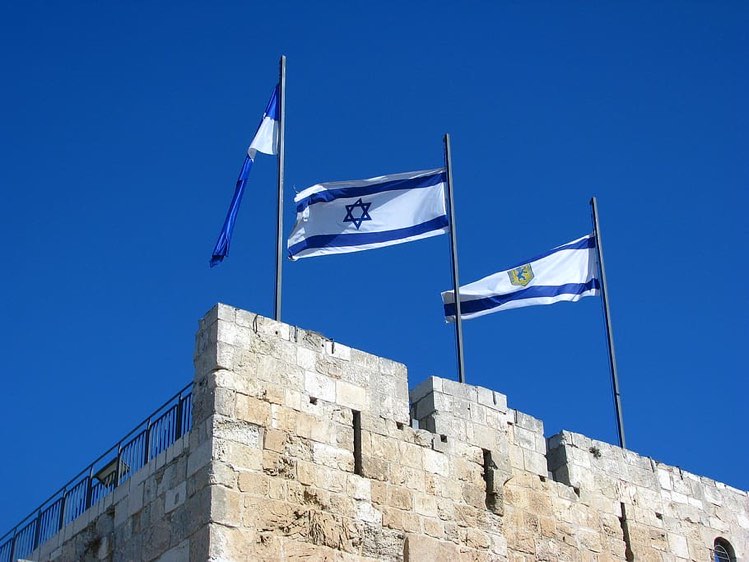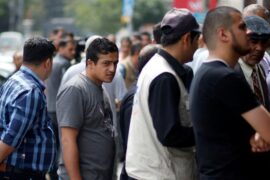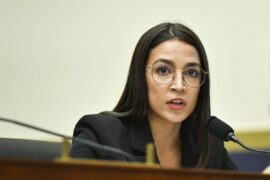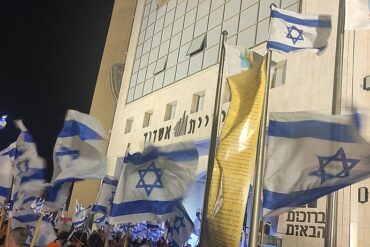Blake Flayton and Samuel Hyde recently coauthored a piece entitled, “The Zionist Case for a Divided Jerusalem.”
The two can be seen as something akin to thought leaders in a “neo-Zionist” movement that sees late 19th and early 20th Century Zionist writings as a guiding ideology that can serve as a basis for Israel’s national identity and provide answers to the various internal and external contradictions that currently challenge Israeli society.
Flayton recently defined what he views as the principles of his Zionism: “that Jews would act as a collective for the betterment of their society, with security, democracy and modernity regarded as its most esteemed ideals.”
From this perspective, Flayton and Hyde argued that in order to maintain Jerusalem – and the State of Israel more broadly – as a secure and Jewish democracy with economic prosperity, the division of the land is a necessity.
Before addressing the details and merits of their actual argument, it is important to understand its deeper implications.
Beyond the economic, political, military, and cultural impact of such a dramatic decision, the dividing of Jerusalem would be the tearing apart of the nation’s heart.
Turning our beating heart into a political bargaining chip, into a piece of real estate, could theoretically possess some short-sighted practical justifications. But by commodifying Zion – placing “security, democracy and modernity” above the beacon of hope that kept the people of Israel alive through two millennia of exile, the neo-Zionists aren’t advancing Jewish history, or even Zionism. They’re simply trying to maintain a status quo that has defined Israeli politics since the foundation of the state.
In the long run, such a status quo does not have ideological foundations deep enough to keep the Jewish nation alive – as recent threats of military desertion, corporate emigration, and municipal secession have demonstrated. Just as in the famous trial of Shlomo, where the woman willing to split the infant wasn’t truly its mother, Zionists willing to compromise on Zion increasingly find their commitment to the national collective crumbling.
With this in mind, we can proceed to the details of Flayton and Hyde’s piece.
The crux of their argument is that the existence of hundreds of thousands of Palestinians and tens of thousands of Ḥaredi Jews inside our capital’s municipal boundaries pose an existential threat to Zionist Jerusalem. They argue that the resistance of these two communities to state educational standards, and their resultant low rates of participation in the workforce, are an unbearable burden for the Zionist quarter of the city’s population – who they claim bare the burden for the rest of the city.
First, their monolithic portrayals of what they call the “tribes” of Jerusalem is convenient for their argument. But the statistical snapshots that they highlighted completely ignore the positive trends of the last two decades. According to the Israel Democracy Institute, national employment rates among Ḥaredi men have risen from a third in 2002 to over half in recent years.
Even if Jerusalem lags behind the rest of the country in Ḥaredi employment, these trends cannot be ignored, and significantly complicate the picture painted by Flayton and Hyde.
As far as Palestinian employment, the trends are also far less worrying than described. The Jerusalem Institute reports that east Jerusalem’s young Arabs are better educated and comparably employed to the general Palestinian population of Israel despite severe transportation limits and discrimination, both formal (degrees from many Palestinian institutes of higher education in the territories aren’t recognized by Israel) and informal (around a third of Palestinian workers listed racism by Jewish employers as a prime obstacle to workplace integration).
The Israel Democracy Institute reports that from 2001-2018, employment for Palestinian women rose nearly 20%.
But even if the numbers were not so encouraging and the future of Ḥaredi and Palestinian integration into the workforce was as bleak as the neo-Zionists suggest, “a divided Jerusalem” isn’t the answer. While Flayton and Hyde acknowledge that there are active steps the Israeli government and the Jerusalem municipality could take to advance education, employment, and standard of living, they argue that such steps would be more costly than they’re worth for the taxpayers of Jerusalem.
Despite such bourgeois economic liberalism being a far cry from the Zionist economic policies that enabled the creation of the state, it’s unclear how feasible it is practically. Regarding Jerusalem’s Palestinian population, there are a few major concerns.
First, where do we draw the line? If they aim to follow the aspirations of opposition leader Yair Lapid (Yesh Atid), and maximize territory while minimizing Arabs, does that entail simply cutting off the villages and neighborhoods on the eastern extreme of the municipal boundaries? If so, between Ḥaredi Jews and the Arabs in and around the Old City, Zionists may still remain a minority within the capital.
And if they plan to retreat to the 1967 lines, by abandoning the Old City, they will have truly emptied the term Zionism of any meaning. Their recognition “that Jerusalem has been the capital of the Jewish people for over three thousand years. Our liturgy, history, and identities are built into the hallowed walls of the Old City,” would be just a meaningless slogan.
Either way, such a division would also create new issues of security arrangements, checkpoints, work permits, etc.. And if, as they claim, Zionism is based on international legitimacy and the United Nations Charter, they’ll have quite a challenge divesting hundreds of thousands of Palestinian Jerusalem residents of their municipal rights. By advocating for sticking Palestinians on the other side of an arbitrary border and abandoning them to an uncertain economic and political fate, the neo-Zionists demonstrate that Zionism is a narrow, bourgeois nationalism, interested only in the material well-being of the Jewish people.
More concerning is the possibility that Flayton and Hyde are not actually advocating any solution at all. That their conception of a divided Jerusalem is merely a maintenance of the status quo, an opposition to full Israeli sovereignty over Jerusalem without any real intention to grant independence to Palestinians in the territories that Israel conquered in 1967 and still controls. This would leave Jerusalem’s Arabic speaking residents in the same political limbo that has created their current educational and economic woes – all in the name of “security, democracy and modernity.”
Furthermore, by framing the issue as a Ḥaredi problem, just as much as an Arab problem, washing our hands of hundreds of thousands of Arabs doesn’t solve the declining demographics of Israel’s Zionist majority. If chopping up the country is the best solution the neo-Zionists can present to their waning numbers, we can expect future proposals to abandon the rest of Jerusalem, Bnei Brak, and large territories in the periphery that don’t fit their image of model cities.
I’d like to present an alternative approach. It may be necessary to examine Zionism critically, to identify where it has succeeded and where it has been less successful, and try to develop new, innovative approaches to the Jewish future in this land. By approaching politics scientifically, without maintaining a dogmatic loyalty to the ideologies of the last century, we may be able to move past “security, democracy and modernity” as ultimate values. Perhaps instead, we can view these values as the means to create a society with far loftier ideals, the ideals of our prophets that have inspired the children of Israel, and all of humanity, to dream of a future of true justice, freedom, and prosperity.
Such an approach won’t necessarily provide immediate answers to all of our societal woes. It will be a long process of learning, adapting, and growing as a nation. But if we don’t begin the work now, we will find ourselves struggling against even greater challenges without the necessary tools to address them. I’d like to invite Blake Flayton and Samuel Hyde to come learn together what our sages and prophets have to say about a Hebrew society, as well as how many contemporary Jewish scholars – primarily the students of Rav Zvi Yehuda Kook – see the State of Israel and its future (before dismissing it all as dangerous messianism).
If we can all manage to keep an open mind, perhaps together we’ll be able to build a new vision for Am Yisrael and for the advancement of humanity.





